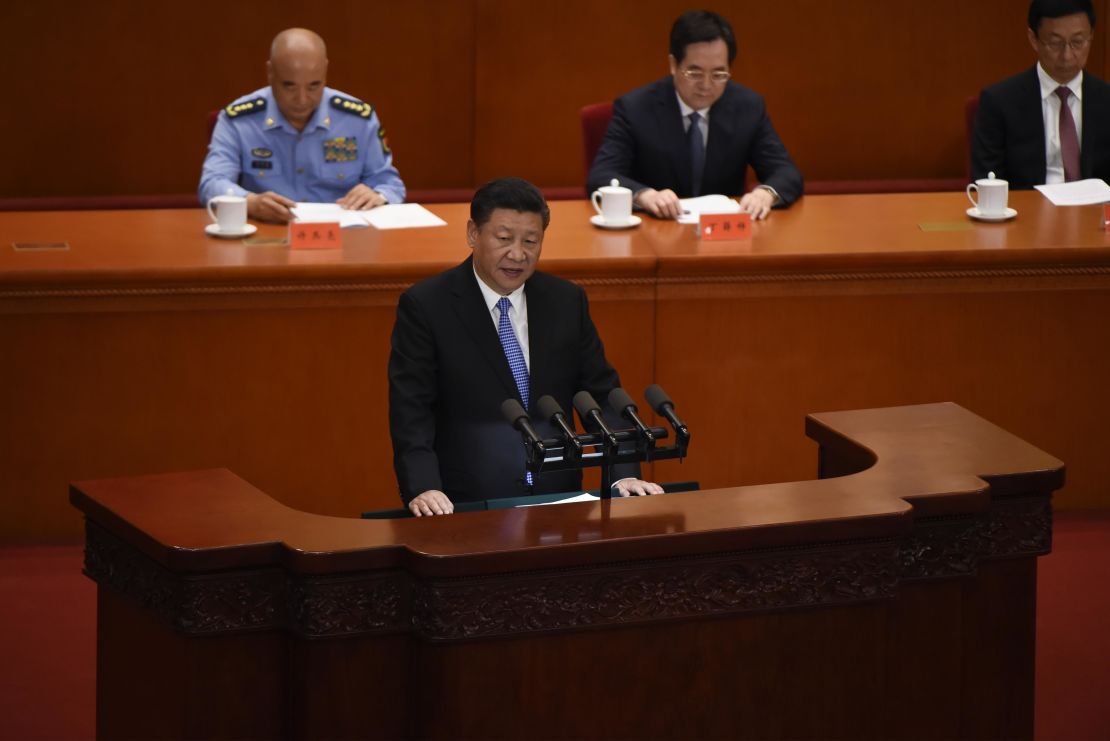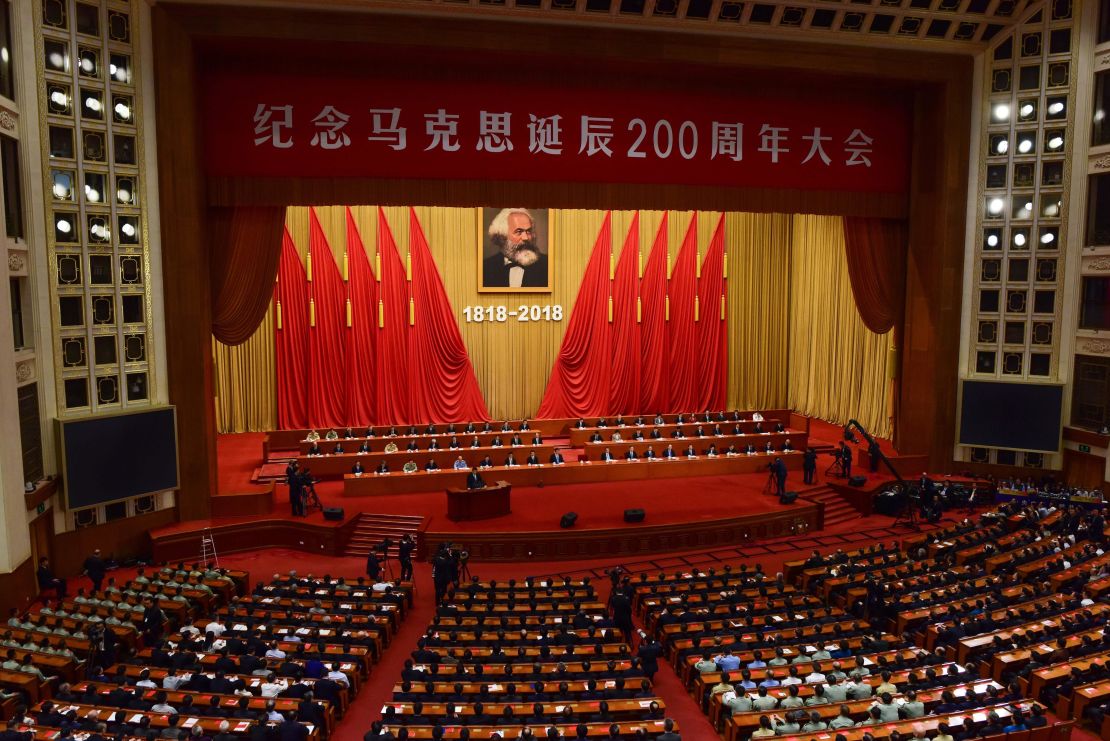Why is President Xi Jinping, the most powerful Chinese leader in decades, presiding over a wealthy and resurgent China, embracing the philosophical ideas of Karl Marx?
The question has arisen as the country emerges from a series of unusually high-profile commemorative events to mark the 200th anniversary of Marx’s birth.
Marx was a German thinker whose political theories on the dangers of capitalism and workers’ rights remain the ideological foundation of Communist China, as well as other socialist nations worldwide.
The week-long celebration in early May included a mandatory study session, led by Xi, of Marx’s “Communist Manifesto” for the country’s most senior officials.

A slickly produced five-episode educational show titled “Marx Was Right” was broadcast on television screens across China. While in Germany, Beijing gifted a giant statue of Marx to his hometown in Trier.
The Chinese government’s Marxism push comes at a time when they are trying to simultaneously portray themselves as the defenders of capitalism, including in several high-profile speeches by Xi at international economic forums.
Wrapping up the events in Beijing, Wang Huning, the country’s chief ideologue, equated Xi Jinping Thought – as the president’s governing theories are known – to “the Marxism of the 21st century.”
‘Marxism of the 21st century’
The comparison between Xi and Marx surprised some longtime China watchers.
“That’s very much a stretch,” said Wenran Jiang, a senior fellow with the Institute of Asian Research at the University of British Columbia in Canada.
While Marxism has always been an “important tool” for China’s Communist rulers to rally the party and nation, Jiang said that Xi and his supporters were now trying to use it to present a different narrative of China’s rise.
“They are saying China’s success didn’t come from a change to capitalism,” he said. “It came from a one party-controlled process of developing its economy, lifting people out of poverty, fighting corruption and creating a fairer society – which were among the original Marxist ideals in the 19th century.”
“They are trying to present an alternative development model, not only economically but also with a theoretical and ideological underpinning,” he added.

According to experts, the flurry of activities surrounding Marx’s anniversary wasn’t really about furthering the philosopher’s goal of toppling capitalism through workers’ revolutions – or the abolition of private property.
They say, at a time when the Western liberal democracies seem to be in disarray, it’s more about advocating a type of “socialism” that Xi has envisioned and implemented in China, now the world’s second-largest economy and a fast-rising superpower.
In a lengthy May 4 speech in Beijing’s cavernous Great Hall of the People, Xi declared the infallibility of Marxism while pledging to adapt it to the Chinese reality, receiving thundering applauses.
“Xi is extremely ambitious,” said Pin Ho, founder and chief executive of New York-based Mirror Media Group, whose numerous publications and websites focus on Chinese politics.
“He sees an opportunity to assume global leadership and needs a theoretical foundation for writing new rules of a world order – but shockingly he chose the Marxist banner.”
Free trade or state intervention?
Both Ho and Jiang said that Marxism in the form that was practiced in the former Soviet Union – and in China before it started its economic reforms in the late 1970s – has long been discredited and discarded in most parts of the world.
Under Xi’s leadership, however, signs abound of a new emphasis on the state’s role in the economy – a throwback to the Soviet-inspired early days of Communist China.
The government reportedly plans to take stakes in more private businesses, while launching an ambitious initiative aimed at upgrading the manufacturing sector. The latter scheme is at the center of the US-China trade clashes.
Amid a rising tide against globalization in the West following the election of populist leaders, Xi’s public backing of “free trade,” notably in a 2017 speech at the World Economic Forum in Davos, seems to have made him an unlikely defender of an essential capitalist concept – a notion nevertheless rejected by many China analysts.
“Xi’s ‘free trade’ is totally different from what it means in the West,” said Ho. “Free trade is based on the free flow of capital and information, as well as the rule of law – but China has neither.
“China’s ‘free trade’ is based on building a wall around itself and then takes advantage of freedoms in other countries,” he said.
Ironically, experts said the validity of Marx’s critique on certain facets of capitalism such as labor conditions and social inequality remained major issues in China today despite Xi’s favorite catchphrase “remembering the party’s original aspirations.”
Iron fist
Since taking power in late 2012, Xi has ruled the world’s most populous country with an iron fist, emphasizing the party’s absolute control over all aspects of society. China observers characterize his crackdown on human rights activism and freedom of expression as unprecedentedly harsh.
If his domestic policies were a manifestation of Xi Jinping Thought, experts argue, then his brand of 21st century Marxism – which some consider is closer to authoritarian capitalism – would undoubtedly trigger alarm in the West.
“Marxism has been the theoretical cause of most of the world’s deadly violence and catastrophes in the 20th century,” said Ho. “It’s a terrible and foolish signal the Chinese leadership is sending to the world with this new round of Marxist fervor.”
“If Xi’s push for Marxism receives more international attention, he may be seen as a Communist leader pushing for a global revival of socialism – making the West increasingly suspicious of his intentions.”
Jiang says that China is still at a stage of “celebrating” its political system – instead of “imposing” it on others – but he shares Ho’s concern, given the current global environment.
He highlighted the contrasting recent developments in China and the United States: Xi has successfully overseen the removal of presidential term limits in the constitution, while President Donald Trump continues to enact unpredictable foreign policy measures toward US allies and adversaries alike.
“Here you have a Chinese strongman who just secured lifelong tenure, asserting influence not only through the so-called Belt-and-Road global trade scheme but also taking on the Western model as whole,” he said.
“But whatever China is doing is overshadowed by Trump… whose actions are taking pressure off of China – as everyone is trying to decipher his next tweet,” he added. “It’s a very fragmented West – I don’t think there is reflection, let alone a united response to an ideological challenge from Xi.”















